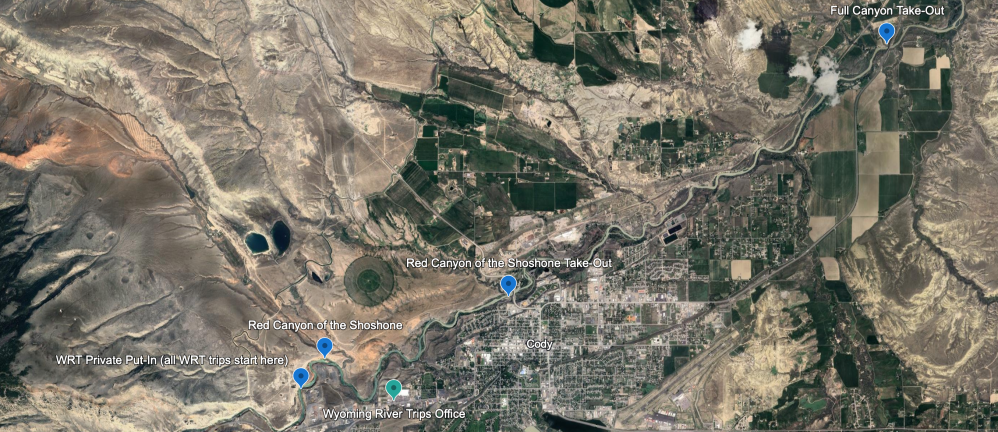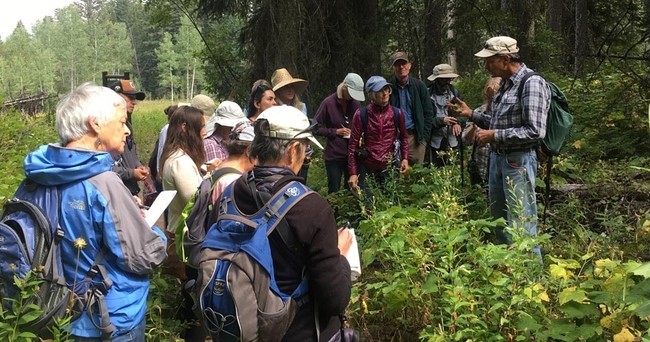Ethnobotany - 2 day Raft Contact for 1 day details
$475/person
July 19th & 20th 2025
- Private boats not available on this trip.
- Inflatable Kayak upgrade not available on this trip.
We are excited to be in our third year of offering this unique and highly rewarding Ethnobotany trip! Spaces are limited and first come first serve.
- Shuttles
- Guides
- Equipment
- Splash Gear
- Stay - cabins or camping equipment
- Meals and snacks
- UXU - Optional Evening Horseback ride
Please dress for the river on the day of your trip:
- Lightweight hiking pants recommended for sun and leg protection as we are hiking through brush.
- Cotton t shirt if it is hot. Non-cotton longsleeve if not.
- Please have a long sleeve for sunprotection to pack in your day bag
- Full water bottle to put in your day bag
- Note pad and pen
- Hat and sunglasses
- Sunscreen at the ready
- sneakers, light hikers or strap on sandals that you can reliably navigate uneven and unmaintained terrain in.
To Pack:
- sleeping bag and small pillow
- Tent – if not borrowing from us (needs to fit in the dry bag provided by Wyoming River Trips)
- Camp shoe
- Long sleeve warmer layer or preferred camp layer
- Long johns or your preferred lounge/ camp pant
- Sleep pant
- Sleep socks (opt)
- Puff jacket
- Warm hat
- Rain jacket
- Rain Pants (optional)
- Wind shirt (optional)
- Headlamp
- Toiletries bag and all medication you usually take
- Small packable backpack or fanny that will fit in your day bag.
Deposits on Specialty and Multi-day trips are non-refundable. Notice of cancellation must happen at least 1 week before trip date for all specialty trip reservation, to be considered for a partial refund. Refunds are not guaranteed.
Reservations made less than 1 week in advance are not eligible for refunds, should the guest need to cancel.
Wyoming River Trips reserves the right to cancel any trip for any reason. Cancellation reasons may include but are not limited to: weather, safety concerns pertaining to water levels, hazards or client ability, environmental factors, client ability levels/fitness/injury or illness. Weather-related cancellations made by WRT may be eligible for a refund.
WRT reserves the rights of and supports any guides’ decision to stop a trip at any point if they feel they can not manage the objective or subjective risks presented by the environment, people or combination of both.
Cancellations due to subjective factors, such as the behavior or fitness of an individual/s in your party will not be eligible for refunds. This includes children.
WRT highly recommends that all participants purchase trip insurance. We do not sell insurance and cannot answer insurance questions. We recommend contacting Faye Travel Insurance or Generali Travel Insurance.
Faye Travel Insurance offers our customers Domestic trip insurance at affordable rates—covering your flights, rv travel, rafting adventure and even instances of food poisoning.
For questions regarding coverage, contact Julie Baker directly: [email protected]
Generali offers trip insurance covering the same for our International guests.
Contact [email protected] for help and reference Wyoming River Trips
** Cancellation Policy for Groups of 10 or more **
Groups of 10-20 must give WRT at least 1 week notice of cancellation and your deposit is non-refundable. If a group cancels within 1 week, WRT reserves the right to charge the full amount of the trip. For groups of 20 or more, cancelations or major changes to the reservation numbers MUST BE MADE 2 WEEKS BEFORE TRIP DEPARTURE. For groups of 20 or more, changes or cancellations made inside of 2 weeks, WRT reserves the right to keep your deposit. Groups of 20 or more are subject to full charge of trip if cancellations are made within one week of trip launch date.
Wyoming River Trips guides are professionals, and your safety is their highest priority. However, no outdoor activity is without some inherent risk. You must acknowledge and, in substantial measure, accept that risk. All adult participants, and parents or guardians of minor participants under the age of 18, must sign an Acknowledgment of Risk form required by our insurance company. Please allow sufficient time for this, and check-in at our office when you arrive.
Please be sure to let us know about physical or mental limitations we need to
Disclaimer:
The information provided on this website, in person and on social media is designed to inspire and educate readers on the traditional and modern uses of plants. We do not encourage or recommend any participants to ingest any wild plant. Any plants encountered and discussed on this trip are presented for visual consideration and educational purposes only.
Wyoming Rivers Co-op, Wyoming River Trips, John Mionczynski and UXU Ranch as well as all associates, affiliates, partners and agents of those listed or others engaged in helping facilitate these trips are not liable or responsible for any consequences resulting from a guests personal decision to consume, try or use a wild food or medicine discussed or encountered during this trip or after this trip based on the information provided here or during the trip, or that a participant hears or sees. Wyoming Rivers Co-op, Wyoming River Trips, John Mionczynski and UXU Ranch as well as all associates, affiliates, partners and agents of those listed or others engaged in helping facilitate these trips do not guarantee the accuracy of the information presented here and all participants assume personal responsibility for fact-checking all information shared during this educational trip. All Participants agree that if they consume or use wild food or medicine, they do so at their own risk.
Medical advice
The information presented here and on this trip is not a substitute for consulting a professional or medical advice of any kind. For your safety, it’s best to consult with qualified experts before making any decisions or taking any actions based on the content provided here or discussed and encountered on the trip.
If you’re pregnant, breastfeeding, taking prescription drugs, have a medical condition, or an allergy, please consult a medical practitioner or herbalist before using or ingesting any of the plants encountered or discussed on this float trip. Take precautions to ensure that the plants you choose are safe and suitable for your specific needs.
Proper Identification
Proper identification is crucial when foraging for wild food. Cross-reference multiple reliable sources and double-check for positive identification before consuming any wild food. If you’re unsure about what you’ve found, it’s best to err on the side of caution and do not eat it. Always prioritize your safety to ensure a safe and enjoyable foraging experience.
Risk assessment
Foraging for wild food always carries a risk, as some plants and mushrooms can be deadly poisonous. When in doubt about the identity or safety of a plant or mushroom, do not consume it.
Exercise caution and proper preparation. To reduce the risk of accidental poisoning, consider foraging with a knowledgeable companion. Keep samples of any wild food you collect to identify them later, in case of an adverse reaction. Always start with a small amount when trying new wild food and wait for any adverse reactions.
Adverse reactions
Recognize that everyone’s body reacts differently to different types of food. Some people may have adverse reactions or sensitivities to certain plants or plant foods, including wild plants and mushrooms.
Basic hygiene
Avoid picking from contaminated areas like high-traffic roads, industrial estates, and dog-walking areas. Watch out for pesticides, pollution, and animal urine. Thoroughly wash your foraged food with water and vinegar before eating to minimize the risk of consuming harmful substances.
Foraging sustainability
The plants and fungi you harvest play an essential role in the ecosystem. To protect wildlife and ensure future growth, be sure to leave enough flowers and fruit behind and allow plenty of seeds to remain for the next year. Never pick a large amount of fungi for ID purposes only, as this can be a wasteful and unsustainable practice. Always leave nature as you found.
If you are participating in this float, you agree to follow the protocols above, to participate at your own risk, that you have taken the necessary personal precautions to participate.
accommodate prior to arrival and about any medication you might need to have with you on the boat (eg. inhalers, EpiPens, etc).
- Flights
- Adult Beverages
- UXU staff gratuity
- Guide Gratuity
Science, Whitewater and Sense of Place | Ethnobotany Float
DUE TO LOW FLOWS THIS ITINERARY HAS CHANGED as of July 14th 2025 Please read – This trip is still two days, however camping on the river and riverside dinner Day 1 are no longer included. We will be floating two different section or river. On the 19th, we will float the Main Shoshone River, have riverside lunch and wrap up around 5pm. Expect many stops and short hikes.
Dinner and accommodations on the night of the 19th are the responsibility of the guest. We recommend the Scout Inn or the Chamberlain Inn or camping on National Forest Land or out at Red Lake on the BLM.
Day 2 will be a scenic float on the Clarks Fork. Lunch and snacks on the river, lots of short hikes. Dinner and drinks at Edelweiss Riverhouse after the float has wrapped up.
This ethnobotany float trip with Wyoming River Trips and John Mionczynski brings science, history and river travel together. It is a unique offering in the Greater Yellowstone are near Cody Wyoming. Discover Ethnobotany, dive deeper into medicinal, edible and useful plants, or introduce a friend to the wonders of what grows all around us.
Day 1 (see changes above) Gear check, plan for the day and 5-7 miles of river travel. We will stop to observe and forage in several different life zones, find and discuss plants, proper identification methods and their past and present uses. Riverside lunch. A North Fork trip features an evening stay at historic UXU ranch, optional horseback ride, and ranch dinner.
A trip on the Big Horn River includes camping, riverside guide prepared dinner and evening activities.
Day 2 (see changes above) Delicious breakfast and heading down river. More hiking, plant and peoples discussion and foraging. We expect to be off the water between 3-4 pm and back to Wyoming River Trips around 5pm.
John Mionczynski, a world renowned Ethnobotanist, is a wealth of pharmacopeia knowledge and you will be astounded by the amount of scientifically complex and historically accurate information he can pack into the time it takes to pick a hawthorne berry.
If you or someone you know is passionate about the useful compounds in the plants all around us, agro-forestry, regenerative agriculture, native plant food and medicine, survival foods etc this is one you do not want to miss!
John Mionczynski has worked in the Wyoming backcountry for 50 years as a wildlife biologist, technician, and outfitter, always supplementing his diet with wild foods, mostly plants. He has taught ethnobotany and edible/medicinal plant classes for The Teton Science School, Central Wyoming College, National Outdoor Leadership School, Earthknack, American Wilderness Botanicals, and the Family Practice Residency Program for medical professionals through the University of Wyoming. Currently he functions as an ethnobotanist for the group, “Restoring Shoshone Ancestral Food Gathering” on the Wind River Indian Reservation and continues to lead Natural History tours in the Red Desert and Wind River Mountain foothills. He is also co-founder of The Native Memory Project which produces archival video footage of tribal elders and other native people in the west speaking of pre-reservation life ways, ancient foods, and other knowledge in danger of being lost to time.
When: July 19th – 20th 2025
What to bring: (More specific list sent in your email confirmation!)
Dress in non-cotton long pants and a tee shirt. Bring a bag with a long sleeve shirt, warm layer to leave in our bus and any medication or medical devices you typically carry with you. A puff jacket for cooler evening temperatures, warm hat, rain jacket. All food is provided. Let us know if you have specific snack needs or dietary restrictions. If you require or want extra snacks bring them. A detailed packing list will be provided in your confirmation email. Tents, sleeping bags, dry bags and pads are available to make your packing simpler. Please keep overnight bags small — all contents should fit in one carryon or smaller size duffel bag.
Where:
Meet at Wyoming River Trips, 233 Yellowstone Avenue at 7am on Day 1. Park in the back of the lot, along the fence on your left.
What to expect:
You will be given a brief orientation in the morning to where we are going, how many stops we will be making and what items you should bring and leave at our office or in your car. Light snacks and coffee provided.
What is included:
* All guides and boating equipment, lunch, snacks and on water beverages day 1 and 2.
* Facilitation and discussion with John Mionczynski and access to dried plants, herbs, and resources he is bringing along
* Lunch – please make us aware of any dietary restrictions and allergies.
* A notebook and pen
* One night stay at UXU Ranch in shared accommodations.
* All necessary sleeping things (Paco pad, sleeping bag, tent) for the night and dry bags (overnight and shared day bags).
* Shuttle to and from the river on day 1 and day 2.
* Bag drop and retrieval
Please note that we have limited space. If you want to bring a personal dry bag for your notebook and extra layers, please keep it small. Willingness to share with others is appreciated. Dry bags and waterproof phone cases are available in our office for purchase pre-trip as well.
Please Arrive at the time indicated in the confirmation email. Give us a call or email if you are unsure of when to arrive. (And, thanks for your patience! The logistics of this trips changes most years and occasionally we miss editing a detail or two.)
Price: $475/ person
Not included: Staff Gratuity, Alcohol and other preferred beverages. WRT can pick these up and pack them for you. Guests are responsible for paying for them, and we ask you to keep beverages to a minimum and drink responsibly if you are bringing alcohol.


